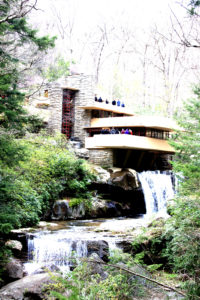
Listed as one of the 28 Places to See Before it's Too Late, Fallingwater is one of Frank Lloyd Wright's crowning achievements.
Six hours in a car may not be your top way to spend a Saturday, but as far as road trips go, you can’t get much better than Fallingwater. If you’ve ever have a craving for a meandering day trip or the yearning to remember that greenery and slow-paced life exists outside of the city, head to Fallingwater. It’s approximately a 3-hour drive northwest of the D.C. metropolis through rolling hills, tree-lined highways and sprawling farmland spotted with quaint little barns. As you’re busy soaking in the scenery and perhaps chomping on some farmland fruit, before you know it you’re there!
Listed as one of the 28 Places to See Before it’s Too Late, this Frank Lloyd Wright house was commissioned by Department store founder Edgar Kaufmann in 1934, at the height of the Great Depression. Fallingwater became known as Wright’s best work and, according to Time magazine, a crowning achievement in American architecture.
The Kaufmann family lived 50 miles away in Pittsburgh, Pennsylvania and wanted a nearby home as a weekend getaway. The family chose a spot along the Bear Run river in the Allegheny Mountains. Originally, the home was to be built downstream within view of the river’s waterfall, but Wright (in his ostentatious manner) had other plans. In less than two hours he had sketched plans to build the home over the main waterfall using existing landscape as the backdrop and the home’s foundation.
Using a series of cantilevers, the three-story home (and a storage basement) includes an open floor plan on the main level with two large balconies, a bedroom on the second level and three bedrooms on the third floor, each bedroom complete with it’s own bathroom and balcony. The house was designed to bring harmony between man and nature, which meant Wright-designed home, furniture and dishes. In fact, Wright purposely created low ceilings so as to push the inhabitants gaze outward to the beautiful surroundings. The focal point on the main level is a large fireplace built on a boulder that spans the hearth, part of the adjoining kitchen and a large part of the outer wall. The home was also strategically positioned in a southwesterly direction in order to take advantage of the natural light that came through the floor-to-ceiling windows, most of which opened to allow the cool breeze of the river to circulate through the home.
Upon completion, Wright had gone three times over budget to complete the house for a grand total of $155,000. Now, considering at that time you could buy a comfortable home for $5,000, that’s saying something. In today’s market, the house would cost over $2.4 million to build. However, beyond the resources to build the home, the house is valued at much, much more. With a series of original Frida Kahlo and Diego Rivera paintings, Japanese scrolls and ancient Mayan artifacts, it is estimated you’d need to earn more than $4 million per-year for proper upkeep and security of Fallingwater.
The family used Fallingwater extensively until 1963 when Kaufmann Jr. donated the home and land to the Western Pennsylvania Conservancy, which is why we get to visit it today. The home is closed Wednesdays and ticket prices range from $20 for a basic tour, $65 for a more in-depth tour (where photography is permitted in doors), to $1,000 for brunch at the home with five of your closest friends. During peak seasons (spring and fall) it’s best to make reservations online.

Melinda Skea got a taste for adventure as her family moved from America’s West to its hospitable south and eventually settled in its fast-paced New England corner. She studied International Relations and Spanish at Brigham Young University and subsequently embarked on a round-the-world trip which included Asia, Oceania and Europe. She has since found a home base in Washington D.C. where she works as an editor for a non-profit publication, but still finds time to put a few stamps in her passport each year.
Melinda is also the founder of D.C.-based Fashion Freecycle, which strives to limit the growing problem of clothing pollution by making “One [wo]man’s trash another [wo]man’s treasure”. These quarterly events encourage women to donate items and swap them for ones they find useful. Also an avid film lover, in 2008 Melinda began a monthly Foreign Film Night, which strives to create an atmosphere of openness, respect and learning as participants dine on the country-of-choice local cuisine and enjoy cinema outside of the usual Blockbuster.








